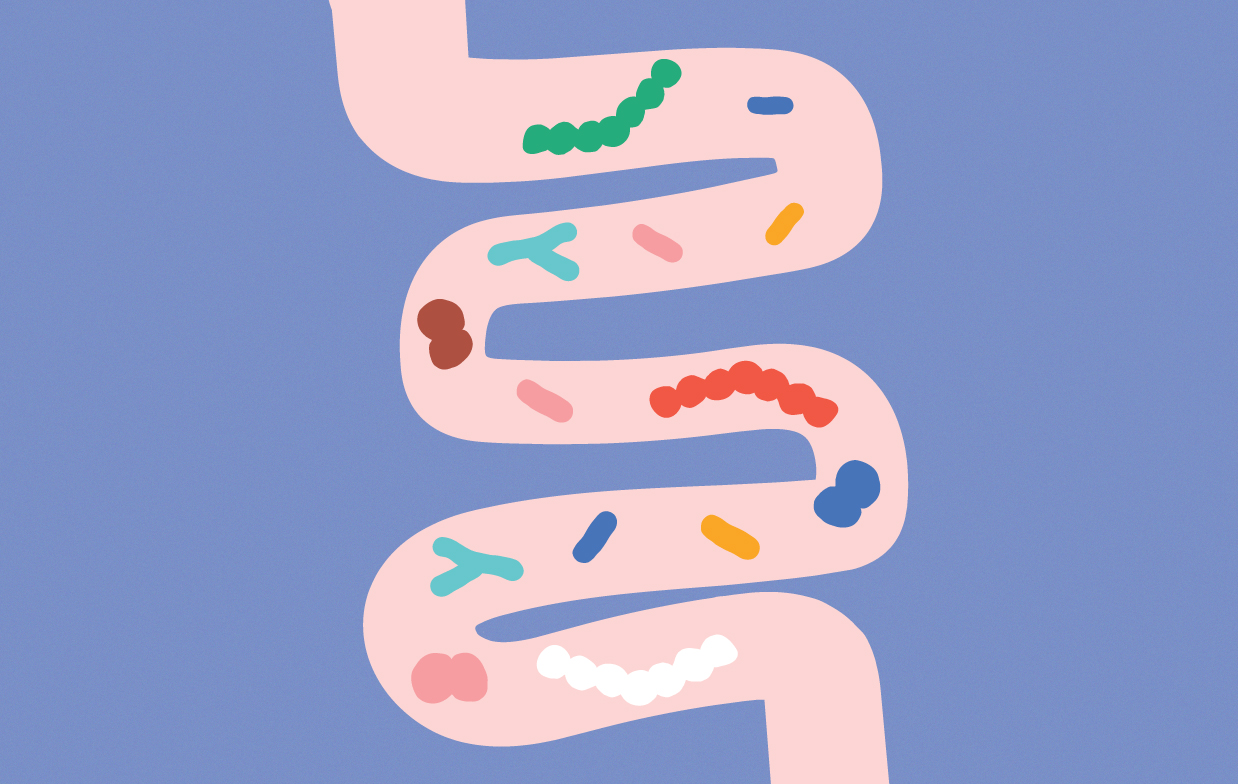Inside this article
Food allergies and allergic conditions are increasing among children in the UK. Due to growing interest in the gut microbiome, there is a rising curiosity about how gut health may be connected to the development of allergic conditions, ranging from food allergies to hay fever. Researchers and health professionals alike are beginning to explore and closely examine the connection between the community of gut bacteria a child has and how the immune system responds to various triggers, including allergens such as food.
In this blog, we’ll cover
- How is gut health linked to the immune system?
- Are there differences in the gut bacteria of children with or without allergic conditions?
- How to support your child’s gut microbiome in the early years – gut health tips that may help prevent allergy
How are gut health and the immune system linked?
Many people don’t realise just how good friends the gut and immune system really are. In fact, around 70% of the body’s immune cells are found in the gut; you could argue that the gut is one of the biggest organs of the immune system. This makes the health of your child’s digestive system incredibly important, especially in those early years when their immune system is still maturing, and their community of gut bacteria is evolving quickly.
A wide variety of factors shape a child’s gut microbiome. This includes factors you can’t control, such as geography and where they live, to those that are more within their control, like how they’re born, whether they’re breastfed, how and when solids are introduced, whether they’ve had antibiotics, and so much more. Several factors can influence the development and function of the immune system, including allergic conditions; however, gut health is increasingly recognised as a key factor worth paying more attention to.
Are there differences in the gut bacteria of children with or without allergic conditions?
The community of bacteria in your child’s gut is increasingly being linked to allergy-related risk factors. A thriving, diverse community of gut microbes appears to help “train” the immune system, supporting its ability to tolerate a wide range of foods or allergens without overreacting. A number of studies, for example, have shown that increased dietary variety (or diversity) during weaning can help reduce food allergy risk (1).
Conversely, emerging research indicates that reduced microbial diversity or an imbalance in certain bacterial types (often called dysbiosis) can be associated with a higher risk of developing food allergies, eczema, or respiratory allergies like asthma. In fact, a 2023 study found that by the age of 1, there were consistent differences in the gut bacteria types between children who did or did not develop allergic conditions in the future(2). Many additional studies have also connected changes in the gut microbiome in children with the risk of allergy, eczema, and other atopic conditions (3,4,5). Put simply, research appears to indicate that children with food allergies or allergic conditions often have a gut microbiome that differs from that of those without.
Although we still don’t have all the answers about what this precisely means and, importantly, how we can change it to reduce allergy risk, understanding these links is helping researchers explore new possibilities for allergy prevention, such as using probiotics, prebiotics, or even microbiome-based therapies to support immune tolerance from early life onwards.
Tips to support your child’s gut microbiome in the early years – and ideally, allergy prevention
While there is still much to learn and many factors beyond our control, such as genetics, I want to reassure you that there are some science-backed ways you can support your child’s gut health during those vital early months and years. These include, but are not limited to;
- Breastmilk – whilst breastfeeding or feeding your baby breast milk isn’t something all mothers want or can do, breastmilk is absolute rocket fuel for a baby’s developing gut microbiome, and any amount of breastmilk is beneficial. Breast milk is a living and dynamic fluid that contains live bacteria, immune cells, and its own prebiotics, which serve as fuel for good bacteria in the form of human milk oligosaccharides.
- Dietary variety – while every parent is well-versed in the benefits of a balanced and varied diet for their kids, variety is the gut microbiome’s favourite meal, especially when it comes to plant-based foods containing their favourite ingredient: fibre. Think fruits, vegetables, beans, pulses, nuts/seeds, whole grains and soy. Fermented foods which contain their bacteria such as aged cheese, live yoghurt, kefir, kimchi and sauerkraut are also great – but you may find your little one finds dairy sources easiest to enjoy!
- Exposure to food allergens – it is now widely accepted that introducing common food allergens, such as egg and peanut, should begin early during weaning, with the aim of introducing them promptly once a child has started solids and continuing to offer them regularly. I often describe it as helping to shut the door on food allergy, as avoiding introduction and exposure via the gut to these common food allergens is leaving the door open for sensitisation.
- Outdoor play and exposure to other children – yes, this isn’t just an excuse for a playdate to the park, the science shows that being outdoors, exposure to dirt (full of microbes) and other children or people can be beneficial for the gut microbiome.
- Reduced exposure to certain drugs – it is no secret that certain drugs, like antibiotics, can disrupt the gut microbiome, but many parents are surprised to hear that widely prescribed medications such as proton pump inhibitors for reflux (like omeprazole) can also disrupt the gut microbiome. Whilst these medications are and should only be prescribed when clinically indicated, parents must be informed about potential side effects, so they can have informed conversations with their healthcare provider and feel confident in the care decisions being made for their little ones.
References
- Bodén, S., Lindam, A., Venter, C., Ulfsdotter, R. L., Domellöf, M., & West, C. E. (2025). Diversity of complementary diet and early food allergy risk. Pediatric Allergy and Immunology, 36(1), e70035. https://doi.org/10.1111/pai.70035
- Hoskinson C, Dai DLY, Del Bel KL, Becker AB, Moraes TJ, Mandhane PJ, Finlay BB, Simons E, Kozyrskyj AL, Azad MB, Subbarao P, Petersen C, Turvey SE. Delayed gut microbiota maturation in the first year of life is a hallmark of pediatric allergic disease. Nat Commun. 2023 Aug 29;14(1):4785. doi: 10.1038/s41467-023-40336-4. PMID: 37644001; PMCID: PMC10465508.
- Shibata, R., Nagatake, T., Yagi, J., Nakayama, J., Morinaga, Y., Kanda, R., Yasuda, K., & Ohno, H., 2024. Neonatal gut microbiota and risk of developing food sensitization and allergy. Journal of Allergy and Clinical Immunology, 155(3), pp.932–946.
- Zhang, X., Huang, X., Zheng, P., Liu, E., Bai, S., Chen, S., Pang, Y., Xiao, X., Yang, H., & Guo, J. (2024). Changes in oral, skin, and gut microbiota in children with atopic dermatitis: A case-control study. Frontiers in Microbiology, 15, 1442126. https://doi.org/10.3389/fmicb.2024.1442126
- Cheung MK, Leung TF, Tam WH, Leung ASY, Chan OM, Ng RWY, Yau JWK, Yuen L, Tong SLY, Ho WCS, Yeung ACM, Chen Z, Chan PKS.2023.Development of the early-life gut microbiome and associations with eczema in a prospective Chinese cohort. mSystems8:e00521-23.https://doi.org/10.1128/msystems.00521-23









